Polyphonic Song
Polyphonic Song
FILMOGRAPHY
-
Documentaries, television programmes
«Ένα τραγούδι για την Ήπειρο» (ντοκιμαντέρ, 35’, 1992), σκηνοθεσία Παναγιώτης Καρκανεβάτος – επιστημονικός συνεργάτης Λάμπρος Λιάβας [«Ena tragoudi gia tin Ipiro» / «A song for Ipiros» (documentary, 35’, 1992), directed by Panagiotis Karkanevatos – advisor Lampros Liavas]
«Τραγουδώντας πολυφωνικά» (ντοκιμαντέρ, 27’, 1996), σκηνοθεσία Αντώνης Τσάβαλος [«Tragoudontas polyphonika» / «Singing polyphonically» (documentary, 27’ , 1996) directed by Antonis Tsavalos.]
«Η Πολυφωνική παραδοσιακή μουσική από τον Καύκασο στην Πίνδο» (ντοκιμαντέρ μεγάλου μήκους, 2006), σκηνοθεσία Γιάννης Καραμπίτσος [«I Polyphoniki Paradosiaki Mousiki apo ton Kafkaso stin Pindo» / Polyphonic traditional music from Caucasus to Pindos»(documentary, 2006), directed by Giannis Karabitsos.]
«15 χρόνια Πολυφωνικό Καραβάνι» (ντοκιμαντέρ, 20΄, 2013), σκηνοθεσία Αλέξανδρος Λαμπρίδης [«Dekapente chronia Polyfoniko Karavani» / «15 years of Polyphonic Caravan» (documentary, 20’, 2013). Directed by Alexandros Lampridis.]
«Κυρά Φρόσω – μια γυναίκα μιλάει και τραγουδάει» (ντοκιμαντέρ, 33’, 2010), σκηνοθεσία Αλέξανδρος Λαμπρίδης [«Kyra Froso – mia gynaika milaei kai tragoudaei» / «Kyra Froso – a woman talking and singing» (documentary, 33’, 2010), directed by Alexandros lampridis.]
«Θεοφάνεια 2014 στα Κτίσματα με τον Φάνη Γιώτη» (ντοκιμαντέρ, 45’, 2015), σκηνοθεσία Αλέξανδρος Λαμπρίδης [«Theophaneia 2014 sta Ktismata me ton Fani Gioti»/ «Epiphany 2014 at Ktismata with Fanis Giotis» (documentary, 45’, 2015) directed by Alexandros Lampridis.]
«Διώνη» (ντοκιμαντέρ, 17’, 2014), σκηνοθεσία Θάνου Ψυχογυιού [Dioni» (documentary, 17’, 2014) directed by Thanos Psichogios.]
«Ελλήνων Δρώμενα», τηλεοπτική εκπομπή της ΕΤ 3, σκηνοθεσία Αντώνης Τσάβαλος [«Ellinon dromena” / “Events of Greeks”, a TV programme of ET3, directed by Antonis Tsavalos.]
«Φωταψίες της άλλης όχθης», τηλεοπτική εκπομπή 902, σκηνοθεσία Αλέξανδρος Λαμπρίδης [«Fotapsies tis allis ochthis»/ «”Illuminations on the other shore”, a TV programme 902. Directed by Alexandros Lampridis.
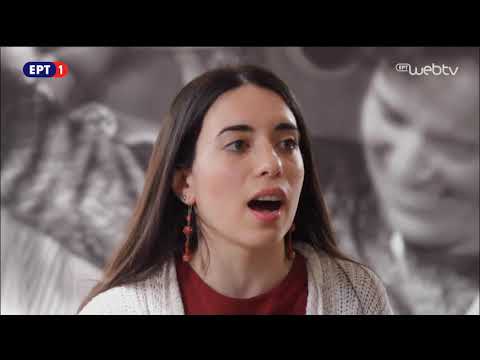
από τα "Αύριο της πολυφωνίας" του Αλέξανδρου Λαμπρίδη (2017, ΕΡΤ)
-
Feature films
«Αναπαράσταση» (1971), σκηνοθεσία Θόδωρου Αγγελόπουλου [ «Anaparastasi» / «Reconstruction», dir. Theo Angelopoulos]
«Ο Γιάννος και η Μαριγώ» (2005, 9’), σκηνοθεσία Lea Binzer [ «O Giannos kai i Marigo» / «Giannos and Marigo», dir. Lea Binzer ]
«Όλοι εμείς εφέντη» (1998, μεγάλου μήκους), σκηνοθεσία Λεωνίδα Βαρδαρού [Oloi emeis efenti» /»All of us, master». Dir. Leonidas Vardaros]
Besides the film material of the documentation it is worth mentioning the Polyphonic Film Archive [Πολυφωνική Ταινιοθήκη / Polyphoniki Tainiothiki ] which was created within the framework of the Polyphonic Song Archive by «Apeiros» non-profit. It consists of a rich archive of in-situ recordings, filming of every single event of the Polyphonic Caravan from 1998 to the present. It includes a wealth of related photographic material of all events, groups, persons and spaces of polyphony, and of the digitization or transcription of older material, which resulted from in-situ collection. The entity of the Echo-Archive and image-Archive of the “Apeiros” Polyphonic Song Archive aspires to feed a single public electronic database, currently under construction.

Η "Αναπαράσταση" του Θ. Αγγελόπουλου είναι η πρώτη ταινία μυθοπλασίας όπου ακούγονται ηπειρώτικα πολυφωνικά τραγούδια
Bibliography
Ανωγειανάκης, Φ. (1985) Η πρωτόγονη μουσική… Η Βυζαντινή μουσική, Πρόσθεση στην ελληνική έκδοση της Ιστορίας της Μουσικής του K. Nef. Αθήνα. [ Anogeianakis, F., I protogoni mousiki… I Byzantini Mousiki, Prosthesis tin elliniki ekdosi tis Istorias tis Mousikis tou K. Nef. ]
Ανωγειανάκης, Φ. (1976) Ελληνικά λαϊκά μουσικά όργανα. Αθήνα [Anogeianakis, F. Ellinika laika mousika organa / Greek folk musical instruments.]
Αραβαντινός, Π. (1880) Συλλογή των δημωδών ασμάτων της Ηπείρου. Αθήνα [Aravantinos, P. Syllogi ton dimodon asmaton tis Ipeirou / Collection of the folk songs of Epirus.]
Αραβαντινός, Π. (1996) Ηπειρώτικα τραγούδια, συλλογή δημωδών ασμάτων. Δαμιανός. Εκδ: Δωδώνη [ Aravantinos, P. (1996) Ipeirotika tragoudia, syllogi dimodon asmaton / Songs of Epirus, a collection of folk songs. ]
Bartok, Β. (1931) Hungarian Folk Musik trust M.D. Calvocoressi Oxford Ynine, Yniversity prew, Edituramusicala, 1967 p. 305-399 (Despre o melodie rusa). London
Baud-Bovy, S. (1984) Δοκίμιο για το Ελληνικό δημοτικό τραγούδι. Ναύπλιο. Εκδ: Πελοποννησιακό Λαογραφικό Ίδρυμα [ Baud-Bovy, S. Dokimio gia to Elliniko Dimotiko tragoudi / An Essay on Greek Folk Singing ]
Baud-Bovy, S. (1990) Κουτσοβλαχικά τραγούδια της Θεσσαλίας (Μτφρ. Δέσποινας Μαζαράκη). Θεσσαλονίκη. Εκδ.¨Αφοί Κυριακίδη [Baud-Bovy, S. Koutsovlachika tragoudia tis Thessalias / Koutsovlach songs of Thessaly. (Transl. Despoina Mazaraki)]
Baud- Bovy, S. (1971) Τραγούδια της Βορείου Ηπείρου και του Πόντου (Μτφρ. Λ. Λιάβα) (περιοδικό «Άπειρος», τεύχος 1 – 1η δημοσίευση «Yearbook of the International Music Council” vol 3 – 1971) [Baud-Bovy, S. Tragoudia tis Voreiou Ipeirou kai tou Pontou / Songs of Northern Epirus and Pontos. (Transl. L. Liavas) (Journal Apeiros, No. 1, 1st publication in the Yearbook of the International Music Council vol 3 – 1971)]
Γκιάγκας, Θ. (1959) Ηπειρωτικά δημοτικά τραγούδια. Αθήνα [Gkiagkas, Th. Ipeirotika dimotika tragoudia. / Folk songs of Epirus. ]
Δημητρίου, Ν. (2000) Βόρειος Ήπειρος, Τραγούδια και χοροί. Εκδ: Τροχαλία [Dimitriou, N. Voreios Ipeiros, Tragoudia kai choroi. / Northern Epirus, Songs and Dances. ]
Ζώτος, Μ., Γιάνναρος, Χ. (1989) Η Πολύτσανη της Βορείου Ηπείρου. Ιωάννινα. Εκδ: Ι.Β.Ε. [Zotos, M., Giannaros, Ch. I Polytsani tis Voreiou Ipeirou / Polytsani of Northern Epirus.]
Ζώτος, Μ. (1974) Το δημοτικό τραγούδι της Βορείου Ηπείρου. Ιωάννινα. Εκδ: Ι.Β.Ε. [Zotos, M., To dimotiko tragoudi tis voreiou Ipeirou. / The folk song of Northern Epirus.]
Fauriel, Cl. (1999) Ελληνικά δημοτικά τραγούδια. Ηράκλειο. Εκδ: Πανεπιστημιακές Εκδόσεις Κρήτης [Fauriel, Cl. Ellinika dimotika tragoudia. / Greek folk songs. ]
Καβακόπουλος, Π. (1978) Μουσική αποστολή στην Ήπειρο (Ανάτυπο από το Ζ’ Τόμο της “Δωδώνης” επιστημονικής επετηρίδας Φ.Σ.Π. Ιωαννίνων). Ιωάννινα [Kavakopoulos, P. Mousiki apostoli stin Ipeiro / Musical mission to Epirus. (Reprint from the 7th volume of «Dodoni», scientific yearbook of the Faculty of Philosophy of Ioannina University).]
Καϊμάκης, Γ. (1995) Εισαγωγικό σημείωμα απ’ το πρόγραμμα της παράστασης «Ο Κύκλος της Ζωής». Θεσσαλονίκη [Kaimakis, G. Introductory note from the programme of the performance «The Cycle of Life».]
Καλογερόπουλος, Τ. (1998) Το Λεξικό της Ελληνικής μουσικής, τ. 1-2-3-4-5. Αθήνα [Kalogeropoulos, T. To Leksiko tis Ellinikis mousikis. / The Dictionary of Greek Music. Vols. 1-2-3-4-5.]
Καρράς, Β. (1972) Θύμησες απ’ το Πωγώνι. Εκδ: Δωδώνη [Karras, V. Thymises ap’ to Pogoni. / Memories of Pogoni. ]
Κασορούχο, Ν. (2003) Με τα τραγούδια και τους χορούς της Δρόπολης. Τίρανα. [Kasoruho, N. Me ta tragoudia kai tous chorous tis Dropolis. / Among the Songs and Dances of Dropulli.]
Κατσαλίδας, Γ. (1994) Περιοχή Θεολόγου Αγίων Σαράντα, Λαογραφία-εθνολογία-ηθογραφία. Ιωάννινα [Katsalidas, G. Periochi Theologou Agion Saranta, Laografia, ethnologia-ithografia. / Theologos area of Sarandë, Folklore-ethnology-ethography. ]
Κατσαλίδας, Γ. (2001) Δημοτικά τραγούδια Βορείου Ηπείρου. Εκδ: Gutenberg [Katsalidas, G. Demotika tragoudia Voreiou Ipeirou. / Folk songs of Northern Epirus. ]
Κατσανεβάκη, Α. (Σεπτέμβριος 1991) Δημοτικά τραγούδια Καλλονής Γρεβενών (Διπλωματική εργασία στο Τ.Μ.Σ. του Α.Π.Θ.). Θεσσαλονίκη [Katsanevaki, A. Dimotika tragoudia Kallonis Grevenon. / Folk songs of Kalloni in Grevena. (Dissertation for the School of Music Studies at the Aristotle University of Thessaloniki).]
Κουλίδας, Κ. (1998) Σωτήρα Ιστορία, τοπωνύμια, τραγούδια γάμου. Ιωάννινα [Koulidas, K. Sotira Istoria, toponymia, tragoudia gamou. / Sotira History, placenames, wedding songs.]
Κώστιος, Α. (1995) Μουσικοτροπίες, τεύχος 3/95, Θεσσαλονίκη [Kostios, A. Mousikotropies. / Musicotropy. No. 3/95]
Κώτσου, Β. (1998) Η Ήπειρος της πολυφωνίας (περιοδικό «Άπειρος», τεύχος 1) [Kotsou, V. I ipeiros tis polyfonias. / Epirus of polyphony. (Journal «Apeiros», No.1)]
Λάβδας, Α. (1957) Πεντάφθογγες κλίμακες εν τη Δημώδη Μουσική της Ηπείρου (Ανάτυπο εκ του Ζ’ τόμου της “Ηπειρώτικης Εστίας”) [Lavdas, A. Pentafthogges klimakes en ti dimodei moysiki tis Ipeirou / Pentatonic scales in the folk music of Epirus. (Reprint from vol. 7 of «Home of Epirus”.]
Λαμπρίδης, Α. – Έξαρχος, Α. (1998) Τραγούδια για μοναχοκοιτάρηδες – συνέντευξη με τους Μενέλο Ζώτο, Παντελή Μάκο (περιοδικό «Άπειρος», τεύχος 1) Lampridis, A. – Exarchos, A. Tragoudia gia monachokoitarides – synenteuksi me tous Menelao Zoto, Panteli Mako / Songs for the self-reliant – interview with Menelaos Zotos, Pantelis Makos. (Journal «Apeiros», No. 1)]
Λαμπρίδης, Α. – Έξαρχος, Α. (1998) Πρόταση για τη διοργάνωση Διεθνούς Φεστιβάλ Πολυφωνικού Τραγουδιού [Lampridis, A. – Eksarxos, A. Protasi gia ti diorganosi Diethnous Festival Polyfonikou Tragoudiou. / Proposal for the organization of an International Polyphonic Song Festival.]
Λαμπρίδης, Α. – Έξαρχος Α. (1999) 1η Διεθνής Συνάντηση Πολυφωνικού Τραγουδιού (περιοδικό «Άπειρος», τεύχος 2) [Lampridis, A. – Eksarxos, A. Proti Diethnis Synantisi Polyfonikou Tragoudiou. / 1st International Polyphonic Song Meeting. (Journal «Apeiros», No. 2)]
Λιάβας, Λ. (1991) Η μουσική (Από το Ένθετο του Δίσκου “Ηπειρωτική μουσική παράδοση 1” Π.Κ.Δ.Ι.). Ιωάννινα [Liavas, L. I mousiki / Music (From the supplement to the Record «Epirus Musical Tradition 1».)
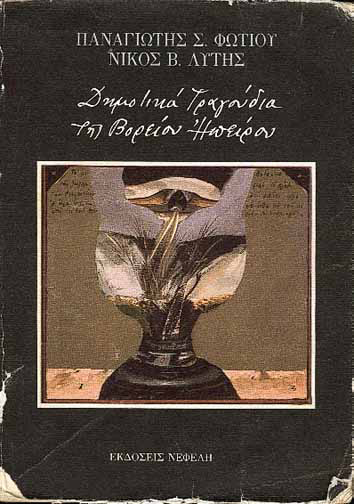
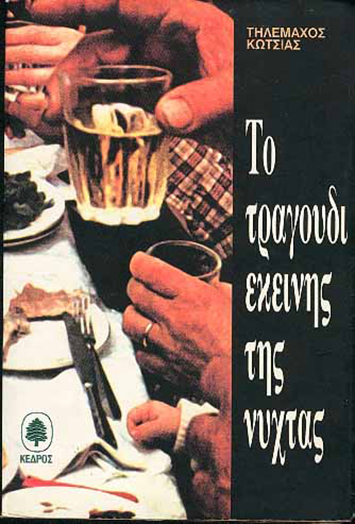
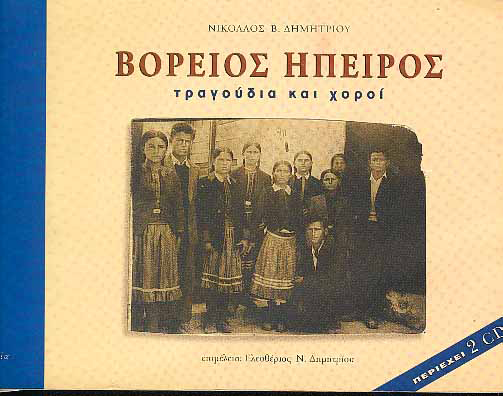
Λιάβας Λ. (1998) Τα πολυφωνικά τραγούδια της Ηπείρου (περιοδικό «Άπειρος», τεύχος 1) [Liavas, L. Ta polyfonika tragoudia tis Ipeirou. / The polyphonic songs of Epirus. (Journal «Apeiros», No. 1).]
Λύτη Ν. (1998) Το μοτίβο στο πολυφωνικό τραγούδι της Βορείου Ηπείρου (περιοδικό «Άπειρος», τεύχος 1) [Lytis, N. To motivo sto polyfoniko tragoudi tis Voreiou Ipeirou./ Motif in the polyphonic song of Northern Epirus. (Journal «Apeiros», No.1.)]
Λώλης, Κ. (Αύγουστος 1994) Το πολυφωνικό τραγούδι της Βορείου Ηπείρου (Χειρόγραφες σημειώσεις για την ομιλία του στις εκδηλώσεις του “παρά θιν αλός” για “των Ελλήνων τις κοινότητες).Θεσσαλονίκη {Lolis, K. To polyfoniko tragoudi tis Voreiou Ipeirou / Polyphonic song of Northern Epirus. (Speech notes manuscript at «para thin’ alos» «ton Ellinon tis koinotites» events.)]
Λώλης, Κ. (1995) Η λαϊκή πολυφωνία στη Βόρειο Ήπειρο (Από το ένθετο του δίσκου «Πολυφωνικά τραγούδια Βορείου Ηπείρου). Ιωάννινα [ Lolis, K. I laiki polyfonia sti Voreio Ipeiro./ Folk polyphony in Northern Epirus. [From the supplement of the record «Polyphonic songs of Northern Epirus.)]
Λώλης, Κ. (1998) Το Πολυφωνικό τραγούδι, αρχαία και πρωτότυπη μουσική παράδοση (περιοδικό «Άπειρος», τεύχος 1) [Lolis, K. To Polyfoniko tragoudi, archaia kai prototypi mousiki paradosi./ Polyphonic Song, ancient and original musical tradition. {Journal «Apeiros»,No.1.)]
Λώλης, Κ. (2001) Ισοκράτες και Ισοκράτημα (περιοδικό «Άπειρος», τεύχος 3) [Lolis, K. Isokrates kai Isokratima. (Journal «Apeiros», No. 3.)]
Λώλης, Κ. (2001) Σκέψεις με αφορμή το CD «Πολυφωνικά Τραγούδια – Ζωντανή ηχογράφηση στο ΠΑΛΛΑΣ (περιοδικό «Άπειρος», τεύχος 3) [lolis, K. Skepseis me aformi to CD «Polyfonika Tragoudia – Zontani Ichografisi sto Pallas. / Thoughts on the occasion of the CD «Polyphonic Songs – Live recording at Pallas. (Journal «Apeiros», No.3)]
Λώλης, Κ. (2006) Το Ηπειρώτικο Πολυφωνικό τραγούδι. Ιωάννινα [Lolis, K. To Ipeirotiko Polyfoniko Tragoudi. / The Polyphonic Song of Epirus. ]
Μαζαράκη, Δ. (1959) Το λαϊκό κλαρίνο στην Ελλάδα. Αθήνα [Mazaraki, D. To laiko klarino stin Ellada. / The folk clarinet in Greece. ]
Μάντζος, Κ. (2001) Παράδοση ή Παραδόσεις: η χρήση της πολιτισμικής διαφοράς, η περίπτωση του πολυφωνικού τραγουδιού (περιοδικό «Άπειρος», τεύχος 3) [Mantzos, K. Paradosi i Paradoseis: i chrisi tis politismikis diaforas, i periptosi tou polyfonikou tragoudiou./ Tradition or Traditions: the use of cultural difference, the case of polyphonic song. (Journal «Apeiros», No. 1)
Μάτσης, Π. (2001) Τσαμαντιώτικα δημοτικά τραγούδια. Αθήνα [Patsis, P. Tsamantiotika dimotika tragoudia. / Folk songs of Tsamanta.]
Μάτσιας, Χρ. (1985) Πωγώνι – Δερόπολη. Ήθη – έθιμα – τραγούδια. Εκδ: Δωδώνη [Matsias, Chr. Pogoni – Deropoli. Ithi – ethima –tragoudia. / Pogoni – Deropoli (Dropull). Traditions – customs – songs.]
Μουσελίμης, Σ. (1927) Δημοτικά τραγούδια της Ηπείρου, Ηπειρώτικα χρονικά 2 [Mouselimis, S. Dimotika tragoudia tis Ipirou, Ipirotika chronika 2. / Folk songs of Epirus, Epirus chronicles 2.]
Μπόλος, Θ. (1999) Ο γάμος στο χωριό μου. Αθήνα [Mpolos, Th. O gamos sto chorio mou. Wedding in my village. ]
Νίκας, Β. (1988) Δημοτικά τραγούδια της Ελληνικής Μειονότητας. Τίρανα [Nikas, V. Dimotika tragoudia tis Ellinikis Meionotitas. / Folk songs of the Greek Minority.]
Νιτσιάκος, Β. (1991) Η Ήπειρος (Από το ένθετο του δίσκου “Ηπειρώτικη Μουσική παράδοση 1” Π.Κ.Δ.Ι.) Ιωάννινα [Nitsiakos, V. I Ipeiros / Epirus. (From the supplement to the record «Ipeirotiki Mousiki paradosi 1» / Epirus Musical Tradition».]
Νιτσιάκος, Β. (1998) Πολυφωνικό τραγούδι: προς μια νέα προβληματοθεσία (περιοδικό «Άπειρος», τεύχος 1) [Nitsiakos, V. Polyfoniko Tragoudi: pros mia nea provlimatothesia. / Polyphonic song: towards new problem posing. [Journal ˆ”Apeiros”, No.1 ]
Ντούση, Ε. (1999) Ηχογράφηση δημοτικών τραγουδιών της περιοχής Πωγωνίου (Διπλωματική εργασία). Θεσσαλονίκη [Dousi, E. Ichografisi dimotikon tragoudion tis periochis Pogoniou / Recording of folk songs from the Pogoni area. (Dissertation).]
Παναγιώτου, Γ. (1994) Δεν είμαστε κι εμείς Ρωμιοί;! Ελληνικά αφηγηματικά τραγούδια από την Β. Ήπειρο. Αθήνα. Εκδ: Του Εικοστού Πρώτου [Panagiotou, G. Aren’t we also Greeks?! Greek narrative songs from Northern Epirus.]
Πολίτη, Γ. (1914) Εκλογαί από τα τραγούδια του Ελληνικού λαού. Αθήνα [Politis, G. Eklogai apo ta tragoudia tou Ellinikou laou./ Selection from the songs of the Greek people. ]
(1947) Ελληνικά δημοτικά τραγούδια. Αθήναι. Ακαδημία Αθηνών [Ellinika dimotika tragoudia / Greek folk songs.]
Περιστέρης, Σ. (1949) Δημοτικά τραγούδια Ηπείρου και Μωρηά. Κατερίνη. Εκδ: Τέρτιος {Peristeris, S. Dimotika tragoudia ipirou kai Moria./ Folk songs of Epirus and the Morea (Peloponnese).]
Περιστέρης, Σ. (1958) Δημοτικά τραγούδια Δροπόλεως Βορείου Ηπείρου. Ακαδημία Αθηνών, Επετηρίς Λαογραφικού Αρχείου Ακαδημίας Αθηνών, Τόμος 9 – 10, Έτη 1955 – 1957. Αθήναι [Peristeris, S. Dimotika tragoudia Dropoleos Voreiou Ipeirou. Akadimia Athinon, Epetiris Laografikou Archeiou Akadimias Athinon / Folk songs of Dropoli (Dropull). Athens Academy, Annual of the Folklore Archive of the Academy of Athens. Vol. 9-10, Years 1955-1957)] Περιστέρης, Σ. Ο εξάσημος ρυθμός εις τα ελληνικά δημοτικά τραγούδια. Επετηρίδα Λαογραφικού Αρχείου Ακαδημίας Αθηνών, Τόμοι 15-16, 1962-63 [Peristeris, S. O eksasimos rythmos eis ta ellinika dimotika tragoudia./ Six-tone rhythm in Greek folk songs. Annual of the Folklore Archive of the Academy of Athens. Vol. 15-16, Years 1962-63.]
Περιστέρης, Σ. (1968) Αθήναι. Ακαδημία Αθηνών [Peristeris, S. (1968)]
Περιστέρης, Σ. (1976) Ο επτάσημος ρυθμός εις τα ελληνικά δημοτικά τραγούδια. Επετηρίδα ΚΕΕΛ, Τόμος ΚΓ’, 1973-74. Αθήναι [Peristeris, S., O eptasimos rythmos eis ta ellinika dimotika tragoudia./ Seven-tone rhythm in Greek folk songs. KEEL Annual, Vol. 23, 1973-74. ]
Σπαταλάς, Γ. (1946) Η μορφολογία των δημοτικών τραγουδιών μας. Αθήναι. Εκδ: Αετός [Spatalas, G. I morfologia ton dimotikon tragoudion mas. / The morphology of our folk songs. ]
Σπυριδάκης, Γ., Περιστέρης, Σ. (1963) Ελληνικά Δημοτικά τραγούδια (μουσική επιλογή), Τόμος Γ’, Ακαδημία Αθηνών. Αθήναι [Spyridakis, G., Peristeris, S. Ellinika Dimotika tragoudia (mousiki epilogi)/ Greek Folk songs (music selection), Vol. 3
Σπυριδάκης, Γ. Ελληνικά δημοτικά τραγούδια (Μουσική εκλογή), Τ.Γ. [Spyridakis, G. Ellinika dimotika tragoudia (Mousiki eklogi). / Greek folk songs (Music selection).]
Tardo, L. (1938) L’ antica melurgjia bizantina. Grottaferata 1938. Canti melurgjiki Greco-Albanesi.
Τέντα,Γ.(1995) Δημοτικά πολυφωνικά τραγούδια Πολύτσανης Βορείου Ηπείρου. (Διπλωματική εργασία) Θεσσαλονίκη [Tenta, G. Dimotika polyfonika tragoudia Polytsanis Voreiou Ipeirou./ Folk polyphonic songs of Polytsani in Northern Epirus. (Dissertation).]
Τέντα Γ. (1998) Δημοτικά πολυφωνικά τραγούδια Πολύτσανης Βορείου Ηπείρου (περιοδικό «Άπειρος», τεύχος 1) [Tenta, G. Dimotika polyfonika tragoudia Polytsanis Voreiou Ipeirou./ Folk polyphonic songs of Polytsani in Northern Epirus. (Journal «Apeiros» , No.1)]
Τσούκας, Π. (1993) Γεια σας αδέρφια! Μια φωνή από το Αργυρόκαστρο. Αθήνα [Tsoukas, P. Geia sas aderfia! Mia foni apo to Argyrokastro. / Hail, brothers! A voice from Argyrokastro (Gjirokastër).]
Φωτίου, Π., Λύτης, Ν. (1995) Δημοτικά τραγούδια της Βορείου Ηπείρου Αθήνα. Εκδ: Νεφέλη [Fotiou, P., Lytis, N. Dimotika tragoudia tis Voreiou Ipeirou. / Folk songs of Northern Epirus. ]
Χασιώτου, Γ. Χρ. (1866) Συλλογή των κατά την Ήπειρον δημοτικών ασμάτων. Αθήνα. Εκδ: Κουλτούρα [Chasiotou, G. Ch. Syllogi ton kata tin Ipeiron dimotikon asmaton. / Collection of folk songs from Epirus.]
In the polyphonic song bibliography, it is worth mentioning the large number of digitized manuscript collections which are the outcome of year-long field research, included in the Polyphonic Library of the Archive of Polyphonic Song of «Apeiros», a non-profit society.
Fiction with extensive reference to the polyphonic song
Δημητρίου, Σ. (1993) Ν’ ακούω καλά τ’ όνομά σου. Εκδ: Κέδρος [Dimitriou, S. N’ akouo kala t’ onoma sou / To hear your name well.]
Δημητρίου, Σ. Τους τα λέει ο Θεός. Εκδ: Μεταίχμιο [Dimitriou, S., Tous ta leei o Theos / God tells them.]
Κώτσιας, Τ. (1998) Το τραγούδι εκείνης της νύχτας. Εκδ: Κέδρος [Kotsias, T. To tragoudi ekeinis tis nychtas / That night’s song.]
Κώτσιας, Τ. (2011) Ο χορός της νύφης. Εκδ: Ψυχογιός [Kotsias, T. O choros tis nyfis / The bride’s dance.]
Published Recordings
(1928) Δίσκος. Εταιρεία ODEON. Άγιοι Σαράντα. (Περιέχονται οχτώ πολυφωνικά τραγούδια με τραγουδιστές από τη Γράψη της Κάτω Δερόπολης). [Record. ODEON Company. Hagioi Saranta (Saranda) – Contains eight polyphonic songs with singers from Grapsi of Kato Deropolis).]
(1935) Δίσκος. Αθήνα. (Περιέχονται τρία πολυφωνικά τραγούδια με Γλυνιώτες τραγουδιστές από τη Ρίζα του Νομού Αργυροκάστρου). [Record. Athens. [Contains three polyphonic songs with Glyniotes singers from Riza of the Argyrokastro (Gjirokastër) Prefecture].
(1962) Ηχογράφηση. Τσικάγο Αμερικής. (Περιέχονται πολυφωνικά τραγούδια με την οικογένεια Σκόπη από τη Γλύνα). [Recording. Chicago U.S.A. (Contains polyphonic songs with the Skopis familyfrom Glyna)].
(1962) Δίσκος. (Περιέχονται δυο πολυφωνικά τραγούδια με Χλωμιώτες και Σχωριαδήτες του Πωγωνίου). [Record. (Contains two polyphonic songs with Chlomiotes and Schoriadites of Pogoni)].
(1964-1965) Σειρά δίσκων 45 στροφών. Εταιρεία RCA VICTOR. (Περιέχονται δέκα πολυφωνικά τραγούδια με Πολυτσανιώτες, Κτισματιώτες, Μαυροπουλήτες και Χρυσοδουλήτες). [A series of 45 r.p.m. records. RCA VISTOR Company (Contains ten polyphonic songs with Polytsaniotes, Ktismatiotes, Mavropoulites and Chrysodoulites)]
(1970) Δίσκος. Εταιρεία OLYMPIΚ. (Περιέχεται ένα πολυφωνικό τραγούδι με την παρέα του Μ. Μάστορα). [Record. OLYMPIK Company. (Contains a polyphonic song with M. Mastoras’ company).]
(1975) Τραγούδια της Ηπείρου 1. Σύλλογος προς διάδοσιν εθνικής μουσικής. Επιμέλεια Σίμωνα Καρά. (Έκδοση βινυλίου 1975, ψηφιακή επανέκδοση 2003 – Περιέχεται το «Αλησμονώ και χαίρομαι» με το Πολυφωνικό των Κτισμάτων). [Tragoudia tis Ipeirou 1. Syllogos pros diadosin ethnikis mousikis. Epimeleia Simona Karra. / Songs of Epirus 1. The Association for the disseminetion of national music. Edited by Simon Karas.]
(1976?) Αλησμονώ και Χαίρομαι, θυμιούμαι το Πωγώνι, κασέτα ηχογράφησης εκδήλωσης στο θέατρο «Διάνα», με τη συμμετοχή ομίλου από το Πωγώνι και με τραγούδια, μεταξύ άλλων: «Φίλοι καλωσορίσατε», «Αλησμονώ και χαίρομαι», «Σηκωθείτε ολίγο ολίγο», «Κούγω τον άνεμο κι αχάει», «Μωρ’ Δεροπολίτισσα», «Τρώτε για να πίνομε», «Έπιασα μια πέρδικα», «Καλότυχα είναι τα βουνά», «Εμείς εδώ δεν ήρθαμε να φάμε και να πιούμε». Με τον ίδιο τίτλο, σε έκδοση της Αδελφότητας Κτισμάτων Νοεχωρίου Πωγωνίου κυκλοφόρησε αργότερα έκδοση με αυτά τα τραγούδια και πρόσθετα, μεταξύ άλλων, τα «Στου παπά τα παραθύρια», «Σε τούτη την τάβλα που είμαστε», «Ο Γιάννος και η Μαριγώ». [ Alismono kai Chairomai, thymioumai to pogoni / I forget and I am happy, I remember Pogoni, recording of an event at «Diana» theatre, with the participation of a group from Pogoni.]
(1984) Chants Polyphoniques et Musique d’ Epire, OCORA. Επιμέλεια Άρη Φακίνου, Δόμνας Σαμίου. (Περιέχονται επτά τραγούδια με το Πολυφωνικό των Κτισμάτων: «Καλότυχα είναι τα βουνά», «Μου ’λεγε η μάνα μου», «Βλάχα πλένει στο ποτάμι», «Κλαιν΄ οι πέρδικες στα πλάγια», «Αλησμονώ και χαίρομαι», «Σηκωθείτε ολίγο ολίγο», «Ο Γιάννος και η Μαριγώ»).
(1985) Τραγούδια της Ηπείρου 2, Σύλλογος προς διάδοσιν εθνικής μουσικής. Επιμέλεια Σίμωνα Καρά. (Έκδοση βινυλίου 1985, ψηφιακή επανέκδοση 2003 – Περιέχεται το «Βλάχα πλένει στο ποτάμι» με το Πολυφωνικό των Κτισμάτων). [Tragoudia tis Ipeirou 2. Syllogos pros diadosin ethnikis mousikis. Epimeleia Simona Karra. / Songs of Epirus 2. The Association for the dissemination of national music. Edited by Simon Karas.]
(1986) Κασέτα. Ιωάννινα. Επιμέλεια Μ. Ζώτου. (Περιέχονται πολυφωνικά τραγούδια με τον πολυφωνικό όμιλο του Ι.Β.Ε. και τη συνοδεία της κομπανίας του Γ. Καψάλη). [Cassette. Ioannina. Edited by M.Zotos.]
(1991) Το τραγούδι των Ελλήνων. Επιμέλεια Γ. Μαρκόπουλου. (Δίσκος – Περιέχεται το πολυφωνικό τραγούδι «Αλησμονώ και χαίρομαι» [ Song of the Greeks, Edited by G. Markopoulos. Record.]
(1991-1992) Ηπειρωτική μουσική παράδοση 1 και 2. Π.Κ.Δ.Ι Ιωάννινα. Επιμέλεια Β.Νιτσιάκου, Λ. Λιάβα. (Περιέχονται τραγούδια με όμιλο από τον Παρακάλαμο και με την οικογένεια Μούκα από το Χλωμό Άνω Πωγωνίου). Περιέχονται τα πολυφωνικά: «Του Κίτσου η μάνα», «Βοσκοπούλα καθισμένη», «Κόρη που πάνεις για νερό», «Πέρα σε κείνο το βουνό», «Του Αλή Πασά» με την οικογένεια Μούκα από το Χλωμό και «Χαριτωμένη συντροφιά» με όμιλο από τον Παρακάλαμο. [Music tradition of Epirus 1 and 2. Edited by V. Nitsiakos, L. Liavas ]
(1992) Τραγούδια της Ξενιτιάς. Καλλιτεχνικός Σύλλογος Δημοτικής Μουσικής Δόμνα Σαμίου. Επιμέλεια Δόμνα Σαμίου, Λάμπρος Λιάβας. (Περιέχεται το τραγούδι «Αλησμονώ και χαίρομαι» με το Πολυφωνικό των Κτισμάτων). Πολυφωνική Ταινιοθήκη [ Tragoudia tis ksenitias / Songs of foreign lands. Edited by Domna Samiou, Lambros Liavas.]
(1992) Τραγούδι στις άκρες του Ελληνισμού. ΛΥΡΑ/ΣΙΝΑΣΟΣ. Επιμέλεια Λ. Λιάβα. (Περιέχονται δύο τραγούδια: «Τι κακό καμα ο καημένος», «Δεροπολίτισσα» με οργανική συνοδεία, με την κομπανία του Κώστα Βέρδη). [Tragoudi stis akres tou Ellinismou/ Song at the ends of Hellenism. LYRA/SINASOS. Edited by L.Liavas]
(1995) Πολυφωνικό της Ηπείρου. Αθήνα. Επιμέλεια Ν. Τάτση. (Δίσκος αυτοτελώς με πολυφωνικά τραγούδια με το Πολυφωνικό των Κτισμάτων). Περιέχονται: «Αλησμονώ και χαίρομαι», «Κλαιν’ οι πέρδικες στα πλάγια», «Γιάννη μου το μαντήλι σου», «Βλάχα πλένει στο ποτάμι», «Ο Γιάννος και η Μαριγώ», «Δεροπολίτισσα», «Ντελήπαπας», «Πίνετε να πίνομε», «Από πέρα απ’ το ποτάμι», «Τρία καλά ’ναι στον ντουνιά», «Γιώργο μας πήρε η άνοιξη». [Polyphoniko tis Ipirou. / Polyphonic [song] of Epirus. Edited by N.Tatsis. Record.]
(1995) Πολυφωνικά τραγούδια Βορείου Ηπείρου. Ι.Β.Η.Ε. Ιωάννινα. Επιμέλεια Μενέλαου Ζώτου, Παναγιώτη Τζόκα. (Δίσκος και CD, δίσκος αυτοτελώς με πολυφωνικά τραγούδια με βορειοηπειρώτικους ομίλους από Χειμάρρα, Πολύτσανη, Χλωμό, Άνω Επισκοπή, Γράψη, Βόδριστα, Σωτήρα, Τσαούσι Καρόκι). Περιέχονται: «Του ΣπυροΜήλιου», «Μόλις κοιμηθεί το κύμα», «Πάνω στη Μακεδονία», «Της ξενιτιάς», «Κυριακή σενιάδα μέρα», «Μια παπαδιά στον αργαλειό», «Όλη την ημέρα και το βράδυ βράδυ», «Κόρη του βουνού» με τον όμιλο της Χειμάρρας, «Ποια είν’ εκείνη που κατεβαίνει», «Σε πολλές χαρές που πήγα», «Όξω πλάτυνε χορέ», «Βεργινάδα», «Μήλο μου, γλυκό μου μήλο» με τον όμιλο του Χλωμού, «Λυγερές καλές κοπέλες», «Πέρα σε κείνο το βουνό», «Παίρνω το δρεπανάκι μου», «Σχίζω ρίζω το λεμόνι», «Φράγκα-Φράγκα Φραγκοπούλα», «Πήγαινα το δρόμο δρόμο», «Γιάννη μου το μαντήλι σου» με τον όμιλο της Πολύτσανης, «Όλες οι βέργες είναι εδώ», «Ένα πουλί θαλασσινό», «Εψές με την αστροφεγγιά», «Ξενιτεμένο μου πουλί» με όμιλο από το Τσαούσι Καρόκι, «Την ημέρα δεν κοιμούμαι» με όμιλο από τη Βόδριστα, «Σεις περήφανα πουλάκια» με όμιλο από την Άνω Επισκοπή, «Νεράντζι από την νεραντζιά» με όμιλο από τη Γράψη, «Όσα λουλούδια έχει η άνοιξη» με όμιλο από τη Σωτήρα. [Polyphonika tragoudia Voreiou Ipirou. (Polyphonic Songs of Northern Epirus.) Edited by Menelaos Zotos, Panagiotis Tzokas. Record and CD.]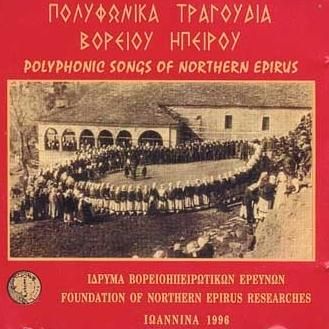
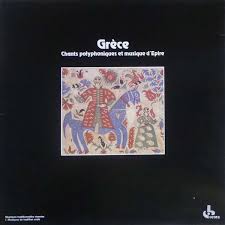
(1996) Δοκίμιο για το Ελληνικό Δημοτικό Τραγούδι, βιβλίο του Samuel Baud- Bovy, Πελοποννησιακό Λαογραφικό Ίδρυμα. Στο συνοδευτικό ηχητικό υλικό (κασέτα) περιέχεται ηχογράφηση της «Δεροπολίτισσας» που πραγματοποίησε η Δόμνα Σαμίου. [Dokimio gia to Elliniko Dimotiko Tragoudi. An Essay on Greek folk singing, book by Samuel Baud-Bovy – the accompanying cassette includes a recording of «Deropolitissa» by Domna Samiou.]
(2000) Πολυφωνικά τραγούδια. Ζωντανή ηχογράφηση στο Παλλάς. ΑΠΕΙΡΟΣ. Αθήνα. Επιμέλεια Α. Λαμπρίδη, Α. Έξαρχου. (CD – Περιέχονται τα ηπειρώτικα πολυφωνικά τραγούδια: «Φίλοι καλωσορίσατε», «Αλησμονώ και χαίρομαι», «Σηκωθείτε αγάλι-αγάλι» με τον Όμιλο των Κτισμάτων, «Πέρδικα και περιστέρα» με το σχήμα «Πολυφωνικό της Ηπείρου», «Χαριτωμένη συντροφιά», «Λενίτσα», «Πως λάμπει ο ήλιος του Μαγιού» με τον Όμιλο του Παρακαλάμου, «Μωρέ βασιλικέ μου», «Άσπρη κατάσπρη βαμβακιά», «Κίνησα να ‘ρθω ένα βράδυ» με τον Όμιλο Άνω Πωγωνίου «Πωγώνι», «Ένα πουλί θαλασσινό» με το σύνολο «Χαονία», «Δημητρούλα», «Του Σπυρομήλιου», «Κάποια μάνα πικραμένη» με τον Όμιλο της Χειμάρρας, «Όσα λουλούδια έχ’ η άνοιξις» με το σχήμα «Πολύφωνο»). [Polyphonica Tragoudia. Zontani ichografisi sto Pallas. / Polyphonic Songs. Live recording at Pallas. APEIROS. Edited by A. Lampridis, A. Exarchos. CD.]
Τα Πολυφωνικά της Β. Ηπείρου. Ζωντανή ηχογράφηση στη Β. Ήπειρο. Εκδ: ΤΡΟΧΑΛΙΑ. (CD), επιμέλεια Λευτέρη Δημητρίου, Τμήμα Μουσικής Ιονίου Πανεπιστημίου. Σε συνοδευτικό του βιβλίου CD περιέχονται τα πολυφωνικά: «Μες στο σιδερένιο αλώνι», «Έχω δυό ώρες σε κοιτάζω», «Σ’ όλο τον κόσμο πήγα», «Ψες σ’ είδα στο όνειρό μου», «Ψες βγήκα να σεριανίσω», «Την άμμον άμμον πήγαινα», «Καλότυχα είναι τα βουνά», «Τι κακό κανα ο καημένος», «Όρκο έχω καμωμένο», «Κυνηγός που κυνηγούσε», «Μες στου Γιωργάκη την αυλή», «Τα τέσσερα, τα πέντε τα εννιάδερφα», «Μηλίτσα που σαι στον γκρεμό», «Χαριτωμένη συντροφιά», «Είπαμε είπαμε ψέμματα», «Ποια μάνα έχει ένα παιδί», «Αλησμονώ και χαίρομαι», «Ο ΜικροΚωνσταντίνος». [ Ta Polyphonika tis V.Ipirou. Zontani ichografisi sti V. Ipiro. / The Polyphonic [songs] of Northern Epirus. Live recording in Northern Epirus. TROCHALIA. (CD). Edited by Lefteris Dimitriou.]
(2001) Πολυφωνικά τραγούδια. Παλλάς 2001. ΑΠΕΙΡΟΣ. Αθήνα. Επιμέλεια Α. Λαμπρίδη, Α. Έξαρχου. (CD – Περιέχονται τα ηπειρώτικα πολυφωνικά τραγούδια: «Γιώργο μας πήρε η άνοιξη» με το σχήμα «Πολύφωνο», «Στης Σαμαρίνας τα βουνά» με το σχήμα «Πολυφωνικό της Ηπείρου», «Αλησμονώ και χαίρομαι», «Δεροπολίτισσα» με οργανική συνοδεία, με το σύνολο «Χαονία», «Μια κόρη από τη Λειβαδιά», «Γλυκοχαράζουν τα βουνά» με τον Όμιλο του Παρακαλάμου, «Στης Δερόπολης τον κάμπο», «Κόρη του βουνού», «Στου παπά τα παραθύρια» με τον Όμιλο της Χειμάρρας). [Polyphonika tragoudia. Pallas 2001. / Polyphonic songs. Pallas 2001. APEIROS. Edited by A. Lampridis, A. Exarchos (CD).]
(2002) Ηπειρώτες Πρωτομάστορες. POP ELEVEN. Επιμέλεια Γρηγόρη Φαληρέα. (Περιέχεται αρχειακή ηχογράφηση, του ’50, του τραγουδιού «Γιάννη μου το μαντήλι σου»). [ Ipirotes Protomastores / Master Builders of Epirus. [POP ELEVEN. Edited by Grigoris Falireas.]
(2003) Πογδόριανη. Καταγραφές Τραγουδιών στον Παρακάλαμο. Νομαρχιακή Αυτοδιοίκηση Ιωαννίνων, Δήμος Άνω Καλαμά. Επιμέλεια Βασίλης Ράπτης. (Διπλό CD). Περιέχονται, μεταξύ άλλων, τα πολυφωνικά: «Λενίτσα μου τον άντρα σου», «Μια κόρη από τη Λειβαδιά», «Γεια σου παπαρούνα μου», «Ένα Σαββάτι βράδυ, ωρ’ Όλγα», «Μωρή, με τα λιανά κουμπιά», «Για δες εκείνο το βουνό», «Φράγκα Φραγκοπούλα», «Γιατί με δέρνεις μάνα», «Χαριτωμένη συντροφιά», «Γλυκοχαράζουν τα βουνά», «Παρακαλώ σε κύρη μου», «Αναστενάζω βγαίνει αχός», «Κάτω στα λιβαδάκια, Θανάσω», «Πως λάμπει ο ήλιος του Μαγιού», «Εκεί ψηλά που περπατείς», «Που πας Λενίτσα μοναχή», «Όλες οι χώρες τα χωριά» και άλλα. [ Pogdoriani. Katagrafes Tragoudion ston Parakalamo. / Pogdoriani. Song recordings at Parakalamos. Edited by Vasilis Raptis.]
(2004) Voci d’ Europa, Projetto Giovani, Regiona Veneto, Ιταλία. (Περιέχονται και πέντε τραγούδια με το πολυφωνικό σύνολο «Χαονία: «Βλάχα πλένει στο ποτάμι», «Κούγω τον άνεμο κι αχάει», «Αυτού ψηλά που περπατείς», «Όσα λουλούδια έχ΄ η Άνοιξις»
(2004) Φωνές της Πέτρας. Μεγάλες Συναυλίες Πολυφωνικού Τραγουδιού 2002-2004. ΑΠΕΙΡΟΣ. Αθήνα. Επιμέλεια, Α. Λαμπρίδη. (CD – Περιέχονται τα ηπειρώτικα πολυφωνικά τραγούδια: «Σε τούτη την τάβλα που ‘μαστε», «Σε περιβολάκι μπαίνω» με τον Όμιλο της Δερβιτσάνης, «Καρδιά με δεκαοχτώ κλειδιά», «Νεράτζι από τη νερατζιά» με τον Όμιλο της Πολύτσανης, «Μια λυγερή τραγούδησε», «Κλαίν’ οι πέτρες τα λιθάρια» με τον Όμιλο της Άνω Δερόπολης, «Λένη και κυρά Λένη» με τον Όμιλο του Αργυροκάστρου και την Ελένη Πότση, «Αυτού ψηλά που περπατείς», «Μια βοσκοπούλα στο βουνό» με τον Όμιλο της Χειμάρρας, «Ένα Σαββάτο βράδυ» με τον Όμιλο του Παρακαλάμου, «Ποια είναι εκείνη που κατεβαίνει» με το σύνολο «Χαονία»). [ Fones tis Petras. Megales Synavlies Polyfonikou Tragoudiou / The Voices of Stone. Great Concerts of polyphonic Song 2002-2004. APEIROS. Edited by A. Lampridis (CD)]
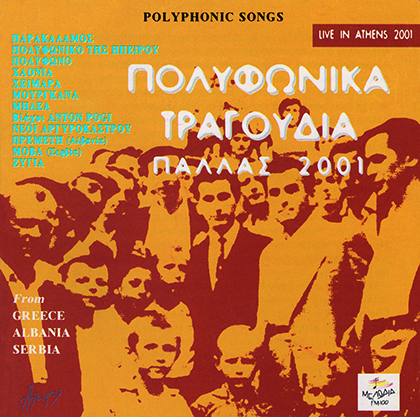
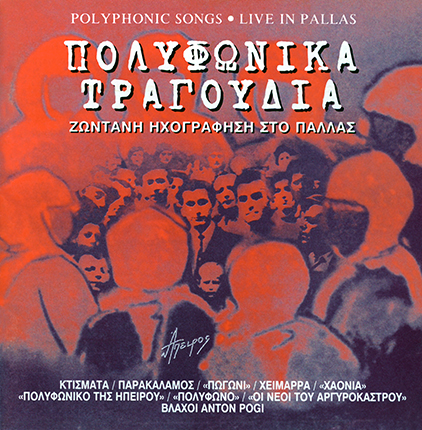
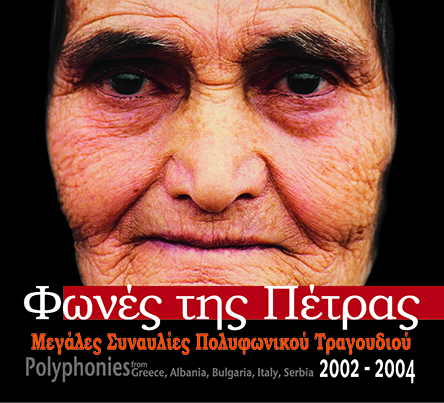
(2006) Φωνές της Πέτρας 2. Μεγάλες Συναυλίες Πολυφωνικού Τραγουδιού 2005-2006. ΑΠΕΙΡΟΣ. Αθήνα. Επιμέλεια Αλ. Λαμπρίδη. (CD – Περιέχονται τα ηπειρώτικα πολυφωνικά τραγούδια: «Ξένος ήμουν ο καημένος», «Μια κόρη ρόιδα μάζευε» με τον Όμιλο της Άνω Δερόπολης, «Κλαίν’ οι πέτρες τα λιθάρια», «Πέρδικα που ‘σαι στη φτέρη» με τον Όμιλο της Δερβιτσάνης, «Όλον το Μάη, Μάη», «Μόλις κοιμηθεί το κύμα» με τον Όμιλο της Χειμάρρας, «Μάγια μου ‘χεις καμωμένα», «Πέρασα από ένα γεφύρι» με τον Όμιλο της Πολύτσανης, «Χαριτωμένη συντροφιά» με τον Όμιλο του Παρακαλάμου, «Κάτω στα λιβαδάκια Θανάσω» με το σύνολο «Χαονία», «Αχ ντουνιά» με το σύνολο «Χαονία» και τον Ηλία Κούρο από το Δολό). [ Fones tis Petras 2. Megales Synavlies Polyfonikou Tragoudiou / The voices of Stone. Great Concerts of polyphonic Song 2005-2006. APEIROS. Edited by A. Lampridis (CD)]
(2006) Το Ηπειρώτικο Πολυφωνικό Τραγούδι. βιβλίο του Κώστα Λώλη, με ένθετο ψηφιακό δίσκο που περιέχει την πρώτη στροφή από τα ακόλουθα τραγούδια: «Ταχτάρισμα», «Αγαπημένη συντροφιά», «Νανουρίσματα», «Παπάδες απ’ τη Σωπική», «Άλφα –Βήτα», «Ένα παλικαράκι ρούσο κι έμορφο», «Στου παπά τα παραθύρια», «Μπιρμπιλομάτα», «Φίλοι καλώς ορίσατε», «Κίνησαν τα καρβάνια», «Έλα μαυρομάτα έλα», «Ντελήπαπας», «Ο Γιάννος και η Μαριγώ», «Φεγγάρι κάνε υπομονή», «Βεργινάδα», «Λενίτσα μου», «Τρέχουν τα νερά», «Όσα λουλούδια έχει η άνοιξη», «Το ίσιο-ίσιο περπατώ», «Από πέρα απ’ το ποτάμι», «Νανούρισμα», «Ξενιτεμένο μου πουλί», «Βλάχα πλένει στο ποτάμι», «Άιντε Μάρω στο πηγάδι», «Σήμερα η μέρα Πασχαλιά», «Μήλο μου, γλυκό μου μήλο», «Σεις περήφανα πουλάκια», «Εψές με την αστροφεγγιά», «Σε περιβολάκι μπαίνω», «Μια συννεφιασμένη μέρα», «Βεργινάδα», «Στης Σαμαρίνας τα βουνά», «Πέρδικα και περιστέρα», «Άσπρη, κατάσπρη βαμβακιά», «Εψές, προψές απέρασα», «Πέντε μήνες ανεβαίνω», «Τον Απρίλη και το Μάη οι χαρές», «Κυνηγός που κυνηγούσε», «Κλαίν’ οι πέρδικες στα πλάγια», «Κόρη που πάνεις για νερό», «Στης Ελένης το κρεβάτι», «Την ημέρα δεν κοιμούμαι», «Του Μάρκου Μπότσαρη», «Γιάννη μου το μαντήλι σου», «Μπροστινέ που χορεύεις», «Φράγκα, φράγκα, φραγκοπούλα», «Κούπα-κούπα μπιρμπιλένια», «Γιώργο μας πήρε η άνοιξη», «Αλησμονώ και χαίρομαι», «Σηκωθείτ’ αγάλια-αγάλια», «Βοσκοπούλα καθισμένη», «Πέρα από ‘να γιοφύρι», «Καλότυχη, καλοήμερη», «Μάνα, καημένη μάνα», «Γλυκοχαράζουν τα βουνά», «Ποια είναι εκείνη που κατεβαίνει», «Έλα με τε μένα», «Πάνω στη Μακεδονία», «Την άμμο-άμμο πήγαινα», «Θα ‘ρθω να σε πάρω», «Όλη την ημέρα», «Βλάχα πλένει στο ποτάμι», «Τρυγόνα», «Στης Δερόπολης τον κάμπο», «Μωρ’ Δεροπολίτισσα», «Ασημένια μ’ αλυσίδα», «Τι κακό έκανα ο καημένος», «Ήπειρος με τα φλωριά σου». [ To Ipirotiko polyfoniko tragoudi. / The polyphonic song of Epirus. Book by Kostas Lolis, including a CD.]
(2007) Πολυφωνικά τραγούδια Δολού Πωγωνίου, Πολιτιστικός σύλλογος Δολού Πωγωνίου. Ιωάννινα. (CD – αυτοτελώς πολυφωνικά, 25 τραγούδια με όμιλο από το Δολό Άνω Πωγωνίου. Περιέχονται τα τραγούδια: «Χαριτωμένη συντροφιά», «Άειντε Μάρω στο πηγάδι», «Μια παπαδιά στον αργαλειό», «Πανάγιω», «Από πέρα απ΄το ποτάμι», «Χαρείτε νιοι τις έμμορφες», «Αλησμονώ και χαίρομαι», «Κλαιν΄οι πέτρες», «Κούπα κούπα κοντυλένια», «Ξένος ήμουν ο καημένος», «Ένας κοντός καλόερος», «Μου ’λεγεν η μάνα μου», «Ένα πουλί θαλασσινό», «Αχ ντουνιά», «Όλες οι χώρες τα χωριά», «Εψές, προψές», «Λάλησε κούκε», «Μη με πεθαίνεις Παναγιά», «Μπατζίτικα», «Σ’ όσες χαρές κι αν πήγα», «Κυριέ μ΄ και ποιος τον κάνει», «Μπατζίτικα», «Μάγια», «Ζαλίζομαι», «Γλώσσα μου». [ Polyfonika tragoudia Dolou Pogoniou / Polyphonic songs from Dolo of Pogoni. (CD).]
(2008) Βήσσανη, Τα πολυφωνικά τραγούδια της, εκδ. Δωδώνη, επιμέλεια Γ. Λεκάκης. Περιέχονται, μεταξύ άλλων, τα τραγούδια: «Ξύπνα περδικομάτα μου», «Σε τούτη την τάβλα που είμαστε», «Το τι αχός που γίνεται», «Λενίτσα μου τον άντρα σου», «Αυτά τα μάτια Δήμο μ’», «Χαριτωμένη συντροφιά», «Τρώτε για να πίνουμε», «Αλησμονώ και χαίρομαι», «Γιάννη μου το μαντήλι σου» και άλλα. [ Vissani. Ta polyfonika tragoudia tis / Vissani – its polyphonic songs. Edited by G. Lekakis]
(2010) Στα μονοπάτια της δημοτικής παράδοσης. Οικογένεια Ντέντε. Δερβιτσάνη. (CD – Περιέχονται πολυφωνικά τραγούδια με την οικογένεια Δέδε από τη Δερβιτσάνη). Περιέχονται τα τραγούδια: «Έβγα θυγατέρα», «Σαράντα πέντε μάστορες», «Καραχρήστος κάνει μάχη», «Σε τούτη τάβλα που είμαστε», «Όταν ήμουνα πουλί», «Ντελήπαπας», «Της Άρτας το γεφύρι», «Μάρκο Μπότσαρη», «Του άμμου άμμου πήγαινα», «Όλη την ημέρα και το βράδυ βράδυ», «Ποιος είδε ήλιο το βραδιό», «Στης Δερόπολης τον κάμπο», «Βλέπω μια στο παραθύρι», «Άστι μου και αυγερινέ», «Σε πολλά κάστρα που πήγα». [ Sta monopatia tis dimotikis paradosis / Along the paths of folk tradition. Dede Family. (CD)]
(2013) Περιπλανώμενες Πλειάδες. Θεσσαλονίκη. (Δέκα τραγούδια με το γυναικείο φωνητικό σύνολο «Πλειάδες»). [ Periplanomenes Pleiades / Wandering Pleiades.]
(2015) Γυναίκες της Πέτρας. Μελωδικό Καράβι, Αθήνα. (Διπλό CD και DVD – Περιέχονται και τραγούδια με το γυναικείο φωνητικό σύνολο «Πλειάδες»). Περιέχονται τα πολυφωνικά τραγούδια: «Γιάννη μου το μαντήλι σου», «Σε πολλές χαρές που πήγα», «Μόλις κοιμηθεί το κύμα», «Τι κακό καμα ο καημένος», «Αλησμονώ και χαίρομαι». [Gynaikes tis petras / Women from Stone. Melodiko Karavi. (Double CD and DVD)]
(2016) Πολυφωνικό Αετόπετρας, Massive Productions, CD – περιέχονται τα πολυφωνικά τραγούδια: «Γιάννη μου το μαντήλι σου», «Αυτά τα μάτια σ΄Δήμο μ’», «Από πέρα απ’ το ποτάμι», «Δεροπολίτισσα», «Ξενιτεμένο μου πουλί», «Πέρα σε κείνο το βουνό», «Ντελήπαπας», «Πίνετε να πίνωμε», «Ο Γιάννης και η Μαριγώ», «Πέρδικα και περιστέρα», «Το ‘μαθες μωρ’ δόλια μάνα» [ Polyfoniko Aetopetras. /Polyphonic [Group] of Aetopetra, Massive Productions, CD ]
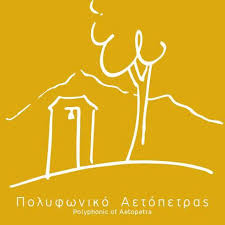
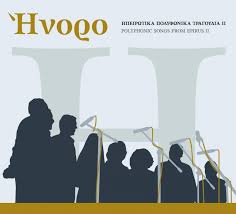
Chronologically unclassified publications 2000-2010
Ηπειρώτικα 1926-1950. Φίλοι του Μουσικού Λαογραφικού Αρχείου. Επιμέλεια Γρηγόρη Φαληρέα, Kείμενα Μάρκου Δραγούμη. (Περιέχονται αρχειακές ηχογραφήσεις τριών πολυφωνικών τραγουδιών). [ Ipirotika / From Epirus 1926-1950 Edited by Grigoris Falireas. Texts by Markos Dragoumis.]
Ήπειρος. Έλληνες Ακρίτες. Αρχείο Ελληνικής Μουσικής. FM RECORDS. Επιμέλεια Γιώργου Κωνστάντζου. (CD – Περιέχονται και πολυφωνικά τραγούδια: «Ένα πουλί θαλασσινό», «Τον άμμον άμμον πήγαινα», «Όλη την ημέρα», «Τούτο το χειμώνα», «Της Χάιδως», «Βασίλω», «Χειμαριώτισσα» με την οικογένεια Δέδε από την Δερβιτσάνη και όμιλο από τη Χειμάρρα). [Ipiros. Ellines Akrites. / Epirus. Greek Frontiermen. FM RECORDS. Edited by Giorgos Konstantzos (CD)]
Κούγω τον άνεμο κι αχάει. Αρχείο Ελληνικής Μουσικής. FM RECORDS. Επιμέλεια Γιώργου Κωνστάντζου. (CD – Περιέχονται και πολυφωνικά τραγούδια: «Ντελήπαπας», «Της Κλεφτοπούλας», «Του Κάστρου της Ωριάς», «Της Χειμάρας» με ομίλους από τη Δερβιτσάνη και τη Χειμάρα). [Kougo ton anemo ki achaei / I hear the wind blowing. FM RECORDS, Edited by Giorgos Konstantzos (CD)
Πήραν την Πόλιν πήρα την. Αρχείο Ελληνικής Μουσικής. FM RECORDS. Επιμέλεια Γιώργου Κωνστάντζου. (CD – Περιέχεται το τραγούδι «Πήραν την Πόλη πήρα την» με όμιλο από τη Δερβιτσάνη). [Piran tin Polin pira tin. / Constantinople has been taken. FM Records. Edited by Giorgos Konstantzos (CD)]
Κρουστά. FM RECORDS. Επιμέλεια Πέτρος Ταμπούρης. (CD – Περιέχονται διασκευές δύο τραγουδιών «Ελενάκι», «Δεροπολίτισσα» με όμιλο από τη Χειμάρα και αυτοσχεδιασμό κρουστών). [Krousta / Percussion. FM RECORDS. Edited by Petros Tampouris (CD)]
Ήνορο. Ηπειρώτικα Πολυφωνικά Τραγούδια. Έκδοση του φερώνυμου συλλόγου. (CD). Περιέχονται: «Άσπρη κατάσπρη βαμπακιά», «Ντελή παπάς», «Όλες οι χώρες τα χωριά», «Νεράντζι απ’ τη νεραντζιά», «Εψές προψές απέρασα», «Μόλις κοιμηθεί το κύμα», «Πέρδικα και περιστέρα», «Αλησμονώ και χαίρομαι», «Λαλείν ο κούκος», «Άλφα – Βήτα», «Άιντε Μάρω στο πηγάδι», «Έπιασα μια πέρδικα», «Πάνω στη Μακεδονία», «Ήπειρος με τα φλουριά σου». [Inoro. Ipirotika Polyfonika Tragoudia / Inoro. Polyphonic Songs of Epirus. (CD).]
Τραγουδώντας τη γη του Πύρρου. Χορωδία Χορευτικού Ομίλου Ομοσπονδίας Μουργκάνας. GENERAL MUSIC, Επιμέλεια Γ. Στεργίου. (CD). Περιέχονται: «Καλώς ανταμωθήκαμαν», «Φραγκοπούλα», «Το ’μαθες μωρ ’δόλια μάνα», «Μάρκο Μπότσαρης», «Ήλιε γιατί μας άργησες», «Ψες είδα στο όνειρό μου», «Κάτω στις μαυροθάλασσες», «Στου παπά τα παραθύρια», «Κόρη με τα λιανά κουμπιά», «Κάτω στην Άι Παρασκευή», «Πανάγιω», «Χάιδω». [Tragoudontas ti gi tou Pyrrou. Chorodia Choreftikou Omilou Omospondias Mourganas. / Singing the land of Pyrrhos. Choir of the Federation of Mourgana dance group. GENERAL MUSIC. Edited by H. Stergiou. (CD)]
Περπατήματα στο χώρο και το χρόνο. Αδελφοξάδελφα Κολιούση. Φιλοπρόοδος Όμιλος Ηγουμενίτσας. (CD – Περιέχονται τρία πολυφωνικά τραγούδια: «Του Μάρκου Μπότσαρη», «Καλότυχα ‘ναι τα βουνά», «Εγώ είμαι τ’ ορφανό παιδί»). [Perpatimata sto choro kai to chrono. Adelfoksadelfa Kalousi. / Walks through space and time. Koliousis brothers and cousins. (CD)]
Besides the audio material of the documentation it is worth mentioning the Audio Polyphonic Song Archive («Apeiros». Polyphonic Caravan) which includes the recordings of all events organized by the Polyphonic Caravan from 1998 until today, as well as a large number of in-situ recordings and digitalized older recordings. In-situ recordings, mainly unrecorded previously, were made by researchers Lampros Liavas, Kostas Lolis, Nikos Dionysopoulos, Georgia Tenta, Kostas Matsias, and others. Finally, of particular value is the archive of the Argyrokastro(Gjirokastër) Radio Station and of the Centre for Research of Greek Folklore (Kentro Erevnas Ellinikis Laografias) of the Academy of Athens.
FILMOGRAPHY
The point in time when the Polyphonic Song of Epirus originated is implied by its scale, its vocal, group, rhetorical character and themes. Researchers who have studied the genre, especially in Greece and Albania, tried to make up for the lack of sufficient documentation for determining its age. Papers by Antonis Lavdas and Spyros Peristeris were the precursors, with the later work by Samuel Baud-Bovy, Lampros Liavas and others being of great importance, while the most recent epitome of relevant research is the book “The Polyphonic Song of Epiros” by Kostas Lolis. In this latter work, one comes across interesting scientific theories and hypotheses on the uncertain beginnings of the genre, its origin, but also the age of its roles, such as, for example, that “in the depths of time, the polyphonic song begins without levelling (i.e. holding the ison, a drone note). The audio evidence provided by the early recordings of the genre (1928 Grapsiotes, 1935 Glyniotes), compared to later recordings, offer valuable material for the study of the contemporary evolution of the genre, highlighting, amongst others, the appearance of the more recent role (richtes).
Personal testimonials regarding an element that has survived for many years under conditions of geographical and social marginalization, like a song of impassable borders and rugged hinterland, provide valuable material. From the live testimonials, we may presume that polyphonic singing was formerly more widespread in Epirus. The dames of Ano Deropolis share childhood memories of their mothers nurturing them during harvest, singing polyphonally, and these blend with the narratives of women from Parakalamos of Ioannina, who mention polyphonic songs, primarily as songs of work in groups – mainly women’s – apart, of course, from the songs of life and rites cycles. This generation’s narratives make mention of a different past. “In days of old, the ravines and the slopes around the fields resonated with song. Now, nothing resonates any longer. Even the birds have flown! Only the river can still be heard as of old.”(Socratis Tsiavos, Ktismata, A.P.T )
The generation that fought in the civil war bears different memories of the same ravines. “In the lull between battles, we would pick up a song, a polyphony, that’s how we had been raised. I vividly remember starting a song on our side and it was picked up and continued by the rebels on the other side” (Giorgos Dotis, Dolo).
The fate of borderline Epirus after the civil war along the border from Grammos to “beyond Kalamas” in Thesprotia, is well known. The isolation of populations is the outcome of the gradual abandonment of the land, in flight to urban centres and emigration overseas. The continuity of the age chain is ruptured, as ages, in their prime, migrate. It is difficult for a genre which depends to such an extent on community, to survive. “You could not find anyone to hold the ison for you. In Germany, I would choose any engine that produced a noise and I would pick up the song. And I would sing with the engine as bass!” (Sokratis Tsavos, Ktismata). Years later, those who remained behind experienced the same. “There ’s no one in the village with whom I can sing. And when I have such a yearning, I take my car, drive it uphill, so the engine can keep the right ison for me and I start singing.”! (Giorgos Dotis, Dolo, Α.P.T.)
The “fate” of the Polyphonic Song of Epirus on the other side of the border has been quite different. The post-war regime of Albania, particularly through the organization of the Argyrokastro (Gjirokastër) Folklore Festival, offers a stage for promotion, at the same time forming a field of intervention for the polyphonic groups. The formation and operation of groups, the composition, their repertoire, the manner of interpretation, fall under the jurisdiction of regional and local regime officials. New songs are expected to praise the “achievements” of the regime, to promote its policy, to specialize it in the field of culture. Another, external hierarchy and discipline is imposed.
At the same time, on the Greek side of the border, the map of survival for the polyphony of Epirus is gradually shrinking. Listening to polyphonic songs from the radio stations of Argyrokastro (Gjirokastër) and Tirana was the sole way to “bridge” the two sides of what, in those days, used to be impassable borders. “We would listen to songs on the radio, we would listen to the partis taking on the whole verse on his own at first, and then they would all repeat it together, with both the ison (level) and the gyrisma (turn) and we said, that’s how we ought to do it! That’s how others could also understand the words. We realized it when we started singing far from Epirus” (S. Tsiavos, Ktismata).
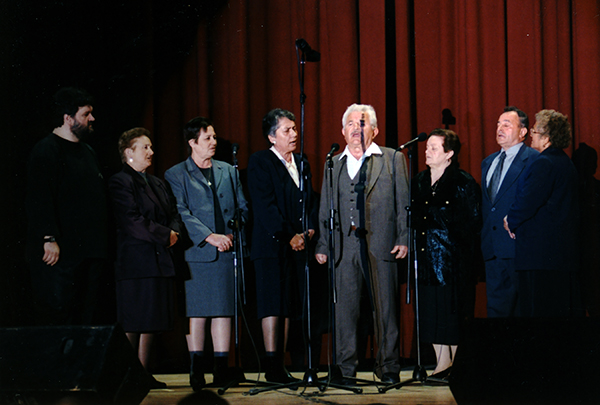
In the polyphonic groups of Ktismata at Pogoni, where the first local recordings were held by Simon Karas and Domna Samiou, the precursor of promotion of the polyphonic song of Epirus is recognized, far from its place of origin, with appearances in Athens and other cities, from 1968 to 1978. In 1984, the Polyphonic group of Ktismata is invited to Paris, where the «Chants Polyphoniques et Musique d’ Epire” are recorded and where the imprint of recent changes is clearly discernible, both in the manner of interpretation (introduction of the prologistes) and in the verses (“Klain’ oi perdikes sta plagia” (= the quails weep on the slopes) in lieu of the older “Klain’ oi petres ta litharia” (=the stones and the rocks mourn). Some years later a second recorded edition of Ktismata follows, entitled “Polyphonic of Epirus”. Meanwhile, the Greek-Albanian borders have opened, and the polyphonic song of “Northern Epirus” can be heard live in Greece, too (Megaron Mousikis – Athens Concert Hall, Zappeion); in 1994 a double vinyl record is published – an exceptional compilation of the groups of those times, entitled “Polyphonika Tragoudia Voreiou Epirou” (“Polyphonic Songs of Northern Epirus).
In 1993, seminars are held at the Museum of Greek Folk Musical Instruments ‘Foivos Anogeianakis”, with Vaggelis Kotsou of Ktismata being the first instructor. There, for the first time, young people not connected to Epirus by origin, are introduced to the polyphony of Epirus. In 1996, the polyphonic group “Chaonia” is formed, and in 1998, its leaders, Alexandros Lampridis and Antonis Exarchos establish the non-profit company “Apeiros”, publish a magazine of the same name, dedicated to the Polyphonic Song, and organize a “Meeting on the Polyphony of Epirus” at Polydroso in Thesprotia. In 1999 they take over the instruction in the seminars at the Museum of Folk Instruments, and ”Apeiros” establishes the International Festival of Polyphonic Song, and organizes the 1st International Meeting of Polyphonic Song in Pogoni and Filiates. With the support of a number of Local Authority bodies in borderline Epirus and, occasionally, of the Ministry of Culture, “Apeiros” continually expands the summer International Meetings in duration, theme and geographical location, spreading their reach all over borderline Epirus, Macedonia, Thessaly. Corfu, Albania, Bulgaria, Southern Italy. It is a multifaceted journey that includes concerts, seminars, local recordings, presentations, and workshops, creating a framework of encouragement for genuine performers, providing contact amongst groups of different peoples, languages, genres, regions and generations, attracting newer pioneers, and enriching the human landscape. The Big Concerts of Polyphonic Song organized by “Apeiros” every summer in Athens, provide crucial empowerment, thus broadly promoting the genre to new audiences.
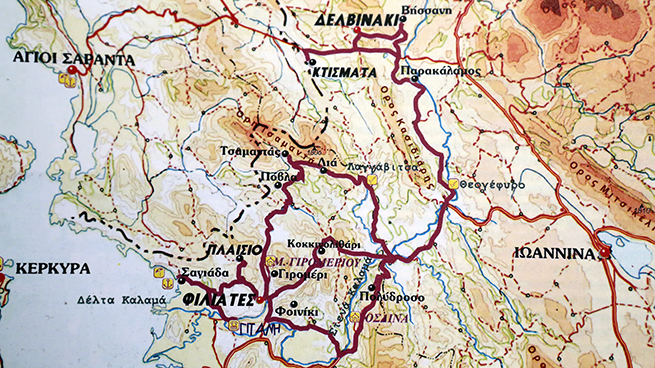
The close contact of groups from different regions, origins and paths, does not leave interpretation unaffected, which, frequently, escapes its local idiom, while its operation is frequently entrenched in the interpretative boundaries of a representational logic. On the other hand, this contact offers older participants the stimulus to preserve their song, to recover and share even more songs, to feel like members of another community beyond their own, in which interpreters, researchers and pioneers of folk polyphony meet, with no limits.
‘Apeiros” constantly remodels the nature of its activities, following a path which is cleared step by step. In 2003 they established the Archive of Polyphonic Song, which is constantly being enriched. The International Meetings are renamed Polyphonic Caravan, and travel for three seasons annually; the Big Concerts are renamed Big Celebrations, where newer groups proliferate and now outnumber the older ones, and the events framework makes way for participative festivals, in the same locations, in a constant rediscovery of locality, in the old and newer common sites of an evolving Community of Polyphony.
At the same time, the number of new groups and new entities, that organize seminars and events, keeps growing. In Athens, the “Polyphonic of Epirus” (V. Kotsou) is active over time, dynamically and in a variety of ways. In Ioannina, in 2003, “Inoros” is formed, a group with a distinctive course and published recordings. The activation of the bodies of Expatriates of Epirus is also critical, as they undertake initiatives, organizing seminars and events. The culmination of these dynamics has been the creation of a Laboratory for the Polyphonic Song of Epirus by the Panepirotic Confederation of Greece (Panepirotiki Synomospondia Elladas) (2012).
All these years, Vaggelis Kotsou, Kostas Lolis, Alexandros Lampridis have been teaching in seminars, At times, a number of their older students, try their hand at teaching – amongst them are Nota Kaltsouni, Alexandros Tsimekas, Vivi Kanellatou, Stathis Polyzos, Michalis Zampas, Areti Miggou, Pavlina Konstantopoulou. In the Polyphonic Caravan seminars, Alexandros Lampridis is flanked by Antonis Exarchos, Maria Tsoukala and Aliki Gana.
In Thessaloniki, two women’s polyphonic groups are formed – “Dioni” and “Pleiades” – with the participation of musicologists of this genre, promoting the genre through participation in concerts, theatrical performances and films. The polyphonic song is also included, through adaptations, in the repertoire of musical groups of other timbres in Greece (e.g. “VIC”), as well as vocal groups abroad (“KITKA” in California, “TRIO TZANE” in Paris). The genre’s journeys abroad, which began with Ktismata in Paris, continued with the groups “Pogoni”, Heimarra, “Polyphonic of Epirus”, “Chaonia”, “Inoros” etc.
The encounter of the Polyphonic Song of Epirus with artistic musical creation has Thanasis Papakonstantinou at the forefront, folllowed by “Hainides”. The first interpretation of a polyphonic song in a play, was in 1998, in “The Murderess” (Fonissa), directed by S. Hatzakis. The first hearing of a polyphonic song in a film, in 1971, was in “Reconstruction” (Anaparastasi) by Theo Angelopoulos.
At Ktismata, a “Centre of Polyphonic Song” is established, through the participation of the Municipalities of Delvinaki and Pogoni in European funding programmes. The independent published recording of newer polyphonic groups is enriched (“Inoros”. “Pleiades”, Aetopetra). There is constant activation in the area of expatriates from the Greek minorities of Albania, through a number of groups; the main milestones are the organization of “Northern Epirus Forum” at Zappeion (2006), the founding of the Northern Epirus Folklore Association “Chaones” (2013) and the formation of polyphonic groups through a number of societies. Over the past few years, the Polyphonic Song of Epirus has been in touch with the so-called “social spaces”, in self-managed cultural initiatives, as well as in solidarity concerts, youth organizations of political parties and antifascist festivals.
The record of the past few years, starting with the founding of the Polyphonic Caravan and the proliferation of all that followed, highlights the wealth and variety of initiatives in the field of the Polyphonic Song of Epirus, which contribute towards expanding the map of its nuclei in the urban environment, the growth of its audience and its variegated travel companions. The Polyphonic Song, from the confines, borderlines and spaces beyond the borders of maps and history, has entered cities, and Polyphony, overcoming its impending defeat by time and neglect, is attempting a new beginning, which allows us to be optimistic concerning its future, the more it is grounded on collective ethos and mentality, reinforcing its character of community in its new social environment. The Polyphonic Song concerns not only collective memory and the living expression of populations indigenously related to it, but also the collective expression of new collectives, thus forming an element of community. It is a limitless Community of Polyphony which increasingly concerns more and more performers, researchers and fellow travellers!
Through the initiative of the Polyphonic Caravan and the response of a series of other initiatives, the informal but living community of Polyphonic Song is already coming together for its next big landmark – the establishment of the International Day of Polyphonic Song which, starting in 2016, will be celebrated with locally self-organized events, every 14th of May, in a number of cities of Greece and other countries.
News - Events
- Polyphony Workshop at KEMFA 2021-2022
- Big Polyphonic Song Celebration 2021 - A deep breath of polyphony in difficult times
- BIG POLYPHONIC SONG CELEBRATION 2021
- Polyphonic Caravan 2021
- 5th of June, World Environment Day
- Action "DIGITAL POLIS-PHONY"
- UNESCO WORKSHOP FOR ICH SAFEGUARDING, 31 May - 4 June 2021
- 14th of May today! "POLYPHONIC SONG DAY"
- PRESENTATION OF THE POLYPHONIC CARAVAN at an international workshop by Aliki Gkana
- SINGING FOR THE MOUNTAINS!
Social Media
The POLYPHONIC CARAVAN in FB
https://www.facebook.com/polyphoniccΤηε aravan
"APIROS" in FB
https://www.facebook.com/polyphoniko.karabani
The POLYPHONIC SONG in FB
https://www.facebook.com/groups/122268124546751/
The POLYPHONIC WORKSHOP in FB
https://www.facebook.com/groups/272180286264330/
the POLYPHONIC CARAVAN to Youtube
https://www.youtube.com/user/polyphonicfestival
https://www.youtube.com/user/api13os
Contact
"Apiros"
Polyphonic Caravan
International Festival of Polyphonic Song
Polydroso, Thesprotia, 4410 17 - GREECE
Pigmalionos 2, Athens 118 51 - GREECE
Tel & Fax (+30) 210 3310 919
This email address is being protected from spambots. You need JavaScript enabled to view it.
test


